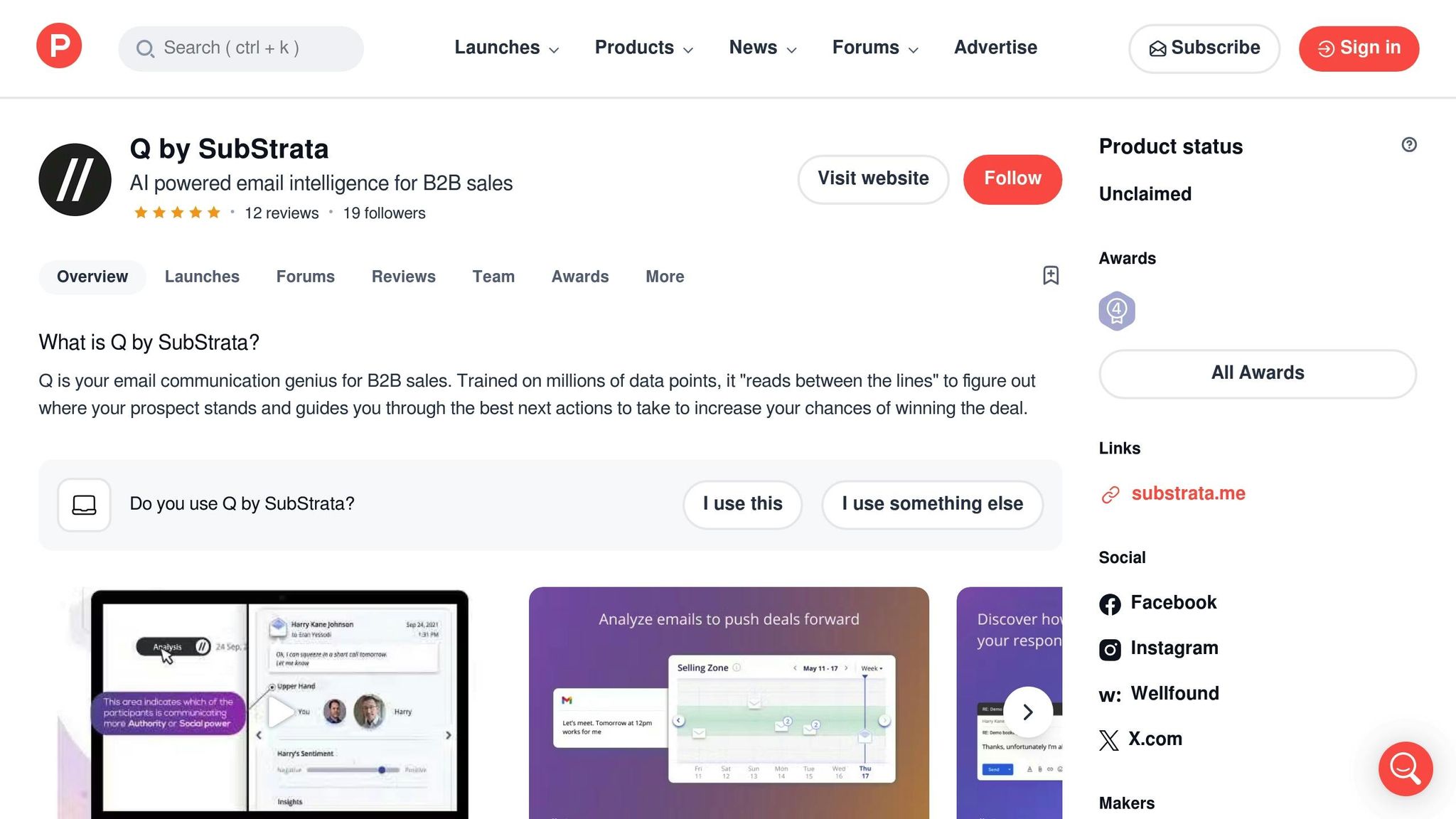AI is transforming sales by analyzing client behavior instantly, helping professionals close deals faster and more effectively. Here's how it works:
- Higher Conversion Rates: AI-driven insights have boosted conversion rates from 15% to as high as 50%.
- Real-Time Feedback: AI tools analyze live client interactions, offering immediate suggestions for better communication.
- Accurate Personality Profiling: AI achieves ~90% accuracy in profiling clients using facial expressions, text analysis, and other data.
- Time Savings: Tasks like client profiling, pre-meeting research, and outreach are automated, saving hundreds of hours.
Key Benefits:
- Tailored communication strategies for each client.
- Faster deal closures, especially with high-value leads.
- Automation of repetitive tasks, freeing up time for relationship building.
AI complements human expertise by delivering data-driven insights while allowing sales professionals to focus on personal connections. Together, they create a more effective sales process.
Behavioral Analysis Tool Boosts Your Sales with Q by Substrata

Key Elements of AI Behavior Analysis
Modern AI tools use advanced techniques to study and interpret client behavior during sales interactions. By analyzing multiple data sources at once, these systems provide insights that help improve sales strategies.
Data Collection Methods
AI behavior analysis begins with gathering information from various sources. A personality AI tool, for instance, is trained on a dataset containing over 50,000 data points to create precise client profiles[1]. These data points come from:
| Data Source | Information Collected | Purpose |
|---|---|---|
| Facial Analysis | Landmarks, expressions, micro-movements | Assessing personality |
| Text Analysis | Communication style, word choice, tone | Understanding communication style |
| Web Scraping | Professional background, hobbies, quotes | Building client context |
| Interactive Assessments | Responses to psychometric questions | Profiling behavior |
This detailed data forms the foundation for pattern recognition algorithms.
Pattern Detection Systems
Using sophisticated algorithms, AI identifies patterns in the collected data to predict client behavior. Clients are grouped into personality types - Knight, Explorer, Healer, and Wizard - each reflecting distinct communication styles and purchasing habits[1].
"I have learned how to sell the way my client wants me to! Different personality has different lingos that require us to present information in their easiest frequency. It puts a language to what we have been applying before on a trial and error basis."
– Karen, AIA Senior Financial Services Manager[1]
With assessments reaching about 90% accuracy, these tools allow sales professionals to adjust their communication strategies for better results[1].
Real-Time Feedback Delivery
Real-time insights have significantly boosted conversion rates and reduced the time needed to close high-value deals[1]. The system evaluates live interactions and suggests adjustments, like emphasizing efficiency and facts when dealing with a Wizard personality. This approach has proven effective in closing high-net-worth deals more efficiently[1].
Using AI for Sales Improvement
AI tools are transforming the way sales teams work by offering data-based insights and automating tasks. These advancements are helping teams connect with clients more effectively and work more efficiently.
Live Sales Coaching
AI systems can analyze conversations as they happen, giving sales reps real-time tips to fine-tune their approach. For example, conversion rates with qualified leads have jumped from 16% to 33% for some users [1].
In addition to coaching, AI helps fine-tune communication by adapting it to each client’s specific needs.
Client-Specific Communication
AI shines in creating personalized communication strategies. Using tools like facial analysis and text-based psychometric profiling, it tailors interactions to individual clients. This approach has improved client engagement and boosted deal closure rates.
"HIS system has helped me tailor my presentation style to the personality type of my client... By cutting pleasantries and being direct, he made a decision in our first meeting after years of no progress."
– Melissa Loo, Financial Services Director [1]
Sales Task Automation
On top of live coaching and personalized strategies, AI takes care of routine tasks, freeing up teams to focus on more important work. The time savings are impressive:
| Task Type | Hours Saved | Impact |
|---|---|---|
| Pre-meeting Research | 646+ | Better preparation |
| Outreach Message Creation | 241+ | More tailored communication |
| Client Profiling | Immediate | 90% accuracy in assessments |
These features are especially useful in industries with high-value deals, where understanding client preferences quickly can make or break a sale. Combining automation with AI-driven insights has led to notable improvements in conversion rates across different types of leads [1].
Implementation Issues
AI tools can improve client understanding and refine sales strategies, but their effectiveness depends on overcoming certain challenges. Addressing these issues is essential for organizations aiming to get the most out of this technology.
Data Security Requirements
Protecting sensitive client information is a top priority when implementing AI systems for behavior analysis. Companies must also comply with privacy regulations to avoid legal and reputational risks. A solid security framework should include:
| Security Measure | Purpose | Impact |
|---|---|---|
| End-to-end encryption | Protects data during processing | Strengthens overall data protection |
| Access controls | Limits who can view data | Reduces the risk of unauthorized access |
| Audit trails | Monitors system activity | Supports compliance and accountability |
Software Compatibility
One common hurdle is integrating AI tools with existing sales platforms. To avoid disruptions, it’s crucial to choose options that offer direct CRM integration, custom API support, and regular updates.
"Mindreader's user-friendly UI and essential features have revolutionized my sales process. It's incredibly easy to use and provides invaluable tools for anyone. A game-changer that every individual for Business or Individual."
– Abhishek Sharma, Program Manager [1]
These features ensure smooth data flow and system performance, creating a foundation for blending technology with human expertise.
AI and Human Skills Balance
AI can provide insights, but sales success still relies on human judgment and personal connection. Instead of replacing human skills, AI should complement them.
"I've learned to adjust my sales approach to match each client's unique communication style, making our interactions more effective and predictable."
– Michael Chen, Senior Sales Director [1]
Sales teams can achieve the best results by:
- Using AI to analyze clients and identify communication styles
- Interpreting AI insights with human expertise
- Building genuine relationships while using data to guide strategies
The goal is to use AI as a tool to enhance interactions - not as a replacement for the human touch.
Conclusion: AI's Role in Modern Sales
AI has reshaped how sales teams engage with clients, driving higher conversion rates through data-driven insights and personalized strategies. These advancements go beyond numbers - they've changed the way professionals build and maintain client relationships.
As highlighted earlier, AI improves sales processes in several ways. It helps professionals understand client behaviors, automates repetitive tasks, and delivers highly tailored communications. This shift has transformed older sales methods, especially in industries where deep client understanding is critical.
The benefits aren't just about saving time - they're changing the game entirely. With AI handling data analysis and routine work, salespeople can focus on what truly matters: building strong, meaningful connections with clients. This blend of technology and human expertise creates a winning formula for modern sales.
The path forward for sales combines AI's strengths with human skills. AI excels at analyzing patterns and delivering actionable insights, while sales professionals use this information to create genuine connections. Together, they form a partnership that enhances the sales process without losing the personal touch that makes it effective. This balance is key to achieving success in today's sales landscape.




